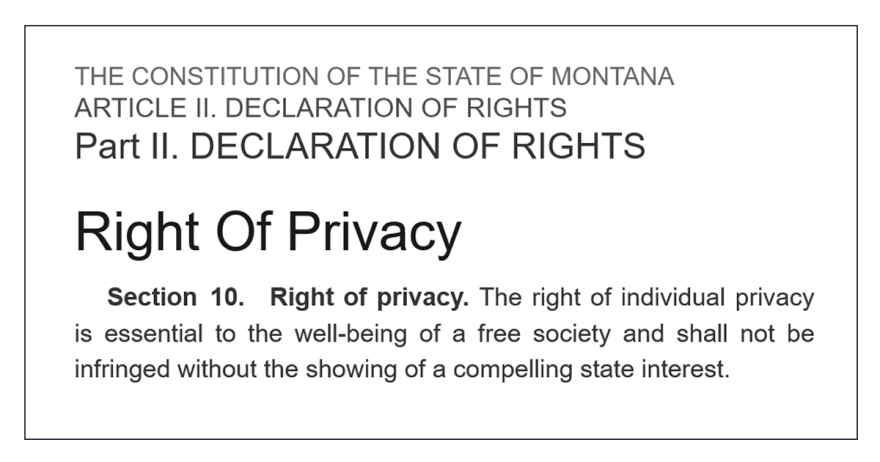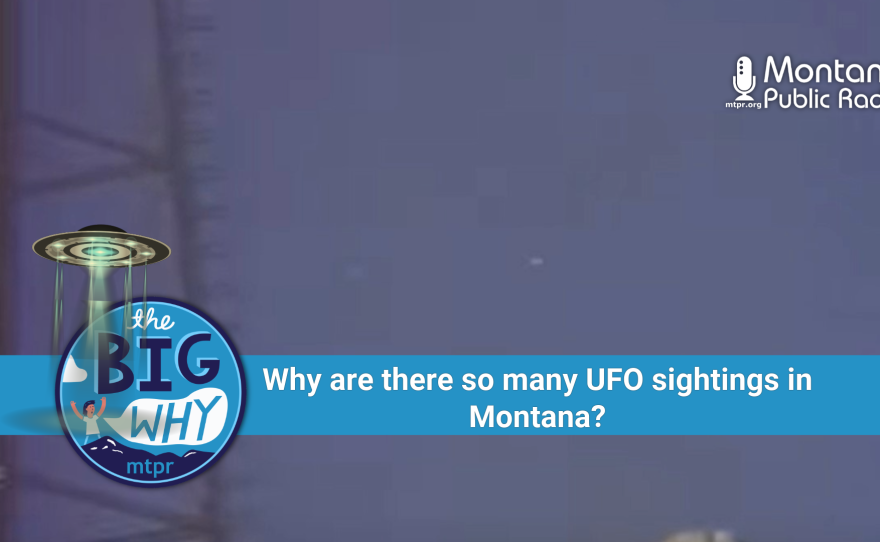Austin Amestoy Welcome to the Big Why, a series from Montana Public Radio where we find out what we can discover together. This is a show about listener-powered reporting. We'll answer questions, large or small, about anything under the big sky. By Montanans for Montana, this is the Big Why.
Today, reporter Shaylee Ragar ...
Shaylee Ragar Hi there.
Austin Amestoy ... is here to answer a question from a long time listener.
Irena Henry My name is Irena Henry and I live in Missoula.
Shaylee Ragar Henry is an avid follower of the news and noted something that had been making headlines recently.
Irena Henry Well, I heard it mentioned on local Montana news, that individual right to privacy protects decision making in many areas, including in health care decisions.
Shaylee Ragar Basically, she saw how this bedrock of Montana law — privacy — was touching all kinds of issues. And we'll get to what those issues are later on. But Henry wanted to know, why is Montana's Constitution so protective of individual privacy?
Austin Amestoy Okay. So where do we start?
Shaylee Ragar 1972.
Austin Amestoy Ah, the year Montana's Constitution was rewritten.
Shaylee Ragar Yes, 100 delegates were elected to serve at the Constitutional Convention, and they spent two months crafting a new Bill of Rights for Montana, including a right to privacy. And the Constitution says that particular right is essential to the well-being of a free society and ...
Rick Applegate Its not to be infringed without the showing of a compelling state interest.
Shaylee Ragar That's Rick Applegate. He was a research analyst at the 1972 Constitutional Convention for the committee that was charged with crafting the state's Bill of Rights. And he reminisced on the drafting of this right, and its future, during a 50th anniversary celebration last spring of that monumental gathering.
Rick Applegate It's an umbrella right over a number of rights, including protections against searches and seizures and so on.
Austin Amestoy An umbrella right over a number of rights. What does that mean?
Shaylee Ragar I'm no legal scholar, so I'm going to introduce another expert to help explain that.
Jim Nelson My name is Jim Nelson, I'm a retired Justice of the Montana Supreme Court.
Shaylee Ragar Justice Nelson was appointed by former Republican Governor Mark Racicot and stayed on the bench for about 20 years. He met me in my office in the basement of the Capitol with a briefcase full of files of past cases and notes. He's kind of an encyclopedia on Montana's right to privacy. Justice Nelson has seen the right to privacy applied, and applied it himself to a wide variety of cases, he's also seen the ways it overlaps with other constitutional rights.
Jim Nelson Personal autonomy privacy. Procreative autonomy privacy.
Shaylee Ragar Personal information privacy.
Jim Nelson Medical records and medical consultations privacy.
Shaylee Ragar Communications, privacy.
Jim Nelson And it also informs freedom of the press and the public's right to know.
Shaylee Ragar All kinds of things.
Austin Amestoy Wow. Did the framers of Montana's Constitution intend for this right to be so broad?
Shaylee Ragar Justice Nelson says yes. The debates over privacy were complicated and heated during the Constitutional Convention, and Nelson's read over the transcripts of those discussions many times.
Jim Nelson They had focus, and one of those focuses was government intrusion into people's lives.
Shaylee Ragar One important thing to note is that "privacy" doesn't explicitly appear in the federal Constitution. So, Nelson says the constitutional delegates in 1972 wanted to give privacy more protection than was offered nationally.
Jim Nelson They didn't like the idea of government snooping. Think about the framers thinking this in 1972 when you didn't have cell phones and you didn't have email. But really, their vision was prescient.
Shaylee Ragar And it's not just texting and Facebook. You create personal data every time you buy something online or search in Google. Present-day policymakers are trying to figure out how to adapt the law when so much personal information now exists online. How does the state constitution continue to protect individual privacy?
Austin Amestoy I think I know where you're going, Shaylee. I did some reporting on a constitutional amendment that was on the ballot last election to add more privacy protections for electronic data.
Shaylee Ragar Right. And we know from your reporting, Austin, that this amendment may not have a dramatic impact that prior Supreme Court precedent, state law and the state right to privacy are already providing protections for our data online. But adding language to the state Constitution makes this protection really clear. The Republican senator, Ken Bogner from Miles City carried the proposal asking lawmakers to put this amendment on the ballot. And it was born of personal experience, being the youngest senator in the chamber. He's somebody who grew up in the digital age.
Ken Bogner You know, I had senators asking, 'how do I do this on my phone, and how do I do that?' And being the I.T. guy for the Senate, basically. And so that kind of spurred like, oh, we probably have some some issues to address in terms of computers and data and privacy.
Shaylee Ragar It had bipartisan support in the Legislature and with the governor's signature it was sent to voters for consideration on last election's ballot. In the end, 82% of voters approved the initiative.
Ken Bogner Montanans care about their privacy, and that was the goal of the initiative, that people really want to send a message to the government that, no, no, this is ours, you can't have it.
Shaylee Ragar So Montanans still really value privacy like they did back in 1972. But when we look at other cases where the right to privacy has been applied, aside from electronic data, it gets much murkier.
Rick Applegate Now, this right is heating up, as you all know, over one particular issue in Montana. An issue that has the potential to rip apart the seams of our society and our culture.
Shaylee Ragar If you remember Rick Applegate, the staffer for the Constitutional Convention Bill of Rights Committee. This is how he describes the debate over access to abortion in Montana.
Austin Amestoy Right. Roe vs. Wade was overturned this summer and some states have banned abortion while others are adding new protections. So what does that mean for abortion in Montana? And how does privacy figure in?
Shaylee Ragar A state Supreme Court precedent from 1997, the Armstrong decision, has been upheld time and again to protect access to abortion in Montana. Remember how Justice Nelson poured over the debates on privacy at the Constitutional Convention? Well, he went on to author the Armstrong decision that found abortion access is protected by the state's right to privacy.
Jim Nelson Women did have, under the right of privacy — and we called it procreative autonomy — we ruled that, had that right to get a pre-viability abortion in consultation with their health care provider free from government interference.
Austin Amestoy So, he's saying state government does not have enough of a compelling interest to block access to abortion?
Shaylee Ragar That's what the state's high court has held, yes. But that doesn't mean the issue is done and over with. Montana Republicans have challenged, and will very much likely challenge again, the Armstrong precedent. The way many Republicans frame this debate, the crux of the issue is about how the government views life, not privacy. Republican Representative Lola Sheldon-Galloway has been a longtime advocate for restricting access to abortion. During an interview with MTPR last spring, she said the movement is gaining momentum.
Lola Sheldon-Galloway There's a lot of hope with the direction that we are going right now for life. God driven, as far as I'm concerned.
Shaylee Ragar The next legislative session begins in January and Republicans will likely try to change abortion policy. Republicans secured supermajorities in both chambers of the state House in the midterm election, meaning they have the votes necessary to send a constitutional amendment to voters to ban abortion without Democrat support if they can find consensus to do so. Their party platform says they support banning abortion in all cases without exception.
Austin Amestoy And that sounds like a pretty big shift from how Montana views privacy today.
Shaylee Ragar Yeah, it would be. And Justice Nelson says that would require changing the core of our system of governance.
Jim Nelson It comes back to this: what model we're going to utilize. A medical model or a sanctity of life model, which is a theological model. And our court stated and held in Armstrong that theology is an impermissible basis on which to make law or interpret the Constitution.
Austin Amestoy Well, we know you'll be watching how the state's right to privacy evolves and report back to us. Thanks for coming on, Shaylee.
Shaylee Ragar Absolutely. Thank you, Austin.
Austin Amestoy Now we want to know what makes you curious about Montana. This show is all about answering your questions, so send them to us here. Subscribe and leave a review wherever you get your podcasts.







